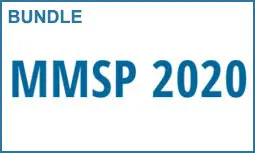Reversible Degradation for Item Validation on MP3 Digital Files
Murilo Sousa Aguiar, Diego Benavides, Max Vizcarra Melgar
-
Members: FreeSPS
IEEE Members: $11.00
Non-members: $15.00Length: 04:50
21 Sep 2020
This paper proposes an item validation implementation for digital MP3 audio files using the reversible degradation definition. Digital goods provide absolutely no guarantee to a buyer about the purchase outcome. Reversible degradation on MP3 files generates a degraded audio file for item validation and redundancy bytes for its further correction. This degraded file preserves its audible and meaningful properties, turning this method an item validation solution that does not require a third trusted part judgment. The reversible degradation algorithm used in this work is based on the 16-bit symbol systematic Reed-Solomon error correction code. Reed-Solomon redundancy bytes are sent from the seller to the buyer to recover the original MP3 file, if and only if, the buyer is authorized to retrieve the full version of the degraded and audible MP3 file. The transmission of the Reed-Solomon redundancy bytes, instead of the original MP3 file, saves around 91% data in the transit link for 128 Kbps, 192 Kbps, and 320 Kbps MP3 bit rates compared to the retransmission of the entire file. The architecture structure and entropy data is evaluated to show the prototype feasibility.



